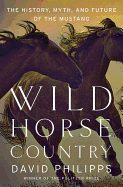
David Philipps (Lethal Warriors), a Pulitzer Prize-winning correspondent for the New York Times, lives on the eastern slope of the Colorado Rockies. On the other side and west lies the Great Basin, the thinly populated land that is home to wild horse herds growing so fast that nobody knows quite what to do with them. Wild Horse Country is Philipps's illustrated investigation into the history, politics, legends and management of these storied symbols of America. Descended from strays, the wild horse "is not pedigreed. It has no stature.... It is beholden to no one. It will not be subjugated." No wonder it is the United States' only animal besides the bald eagle to be protected by specific national law--and no wonder this law has created such philosophical, financial and emotional drama.
Philipps interviews paleontologists who verified the presence of early horses in North America 50 million years ago. He describes the Spanish explorers' reintroduction of the horse in about 1500, and its adoption by Native Americans. Philipps also explores the backdrop to Zane Grey's 40 pulp novels of the Wild West. However, Philipps reserves more concern for the current state of these inspirational animals. The Federal Bureau of Land Management (BLM) manages the herds. With little budget and a typical bureaucratic snarl of regulations and acronyms, the BLM is trying to deal with a mustang population growing 15% a year.
The colorful, well-researched and well-reasoned Wild Horse Country concludes with an attempted answer to the wild horse dilemma, "something that could limit the herds without poisoning the legend." --Bruce Jacobs, founding partner Watermark Books & Cafe, Wichita, Kan.

